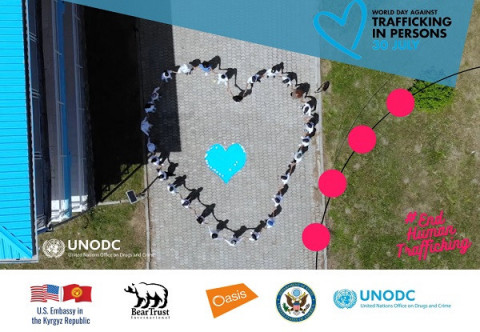
GCED Basic Search Form
Quick Search
You are here
News

UNODC and Oasis Foundation Share Safety Tips to Protect Youth from Trafficking in Persons in Kyrgyzstan
With the digital globalization - intensified by the COVID-19 pandemic and the shift of our everyday life to online platforms -- the crime of human trafficking has conquered a cyber space. The internet and digital platforms offer traffickers numerous tools to recruit, exploit, attract and control victims; organize their transport and accommodation; and reach out to potential clients; communicate among perpetrators; and hide criminal proceeds – and all that with a greater speed, cost-effectiveness, and anonymity.
To support youth with life-skills and information about cybersecurity, UNODC together with the Oasis Foundation organized a two-day interactive camp for 14 children from Chui oblast orphanage and 12 children of labor migrants. According to the research conducted by UNODC and the Oasis Foundation in 2021, children of labor migrants and orphans are highly vulnerable and most at risk of becoming victims of violence and trafficking in persons.
“Annually UNODC marks the World Day Against Trafficking in Persons and this year’s theme focuses on the role of technology as a tool that can both enable and impede human trafficking”, says Ms. Aida Isabekova, UNODC expert in Kyrgyzstan. “Human traffickers have become adept at using internet platforms, including social media channels, online marketplaces, and free-standing webpages to recruit victims and attract clients. We shared safety tips to protect youth from trafficking in persons”.
Each year many young people migrate to big cities in search of employment and educational opportunities. According to the survey conducted by the Oasis Foundation among 480 young women and men, about 30% of them admitted that they were not paid a salary during employment, and that their passports and other documents were taken away.
“This camp is a launching pad for further support of vulnerable youth. To make this process sustainable, each participant of the two-day camp will receive access to the Bilim-Belek educational program, through which they can acquire additional skills and knowledge”, informed Ms. Nadira Karatbekova, Oasis Foundation Programme Manager.
Ms. Karatbekova emphasized that the children who participated at the camp are beneficiaries of the Oasis Foundation. “Children of labor migrants were suggested to us by the Ministry of Labor and Social Development of the Kyrgyz Republic”, she added.
Participants gained knowledge and skills on safe and responsible migration, employment, educational opportunities, how and where to recover lost or stolen documents, access to housing and social protection, as well as on safe technology use.
On the second day of the event, each child wrote his/her understanding about trafficking in persons and how to protect yourself from it. They glued their notes to a blue heart to demonstrate their solidarity with the victims of human trafficking.
“A positive outcome was that the participating children emphasized the importance of reaching out to the police for help and double-checking information about tempting job offers”, concluded Ms. Aida Isabekova, UNODC expert in Kyrgyzstan.
